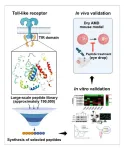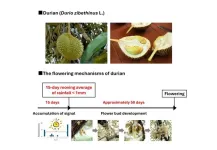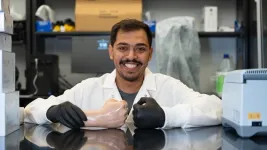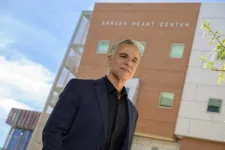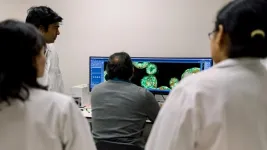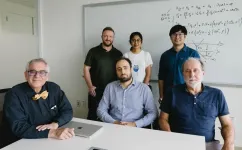(Press-News.org) In a recent analysis of data from more than a dozen studies, coffee and tea consumption was linked with lower risks of developing head and neck cancer, including cancers of the mouth and throat. The findings are published by Wiley online in CANCER, a peer-reviewed journal of the American Cancer Society.
Head and neck cancer is the seventh most common cancer worldwide, and rates are rising in low- and middle-income countries. Many studies have assessed whether drinking coffee or tea is associated with head and neck cancer, with inconsistent results.
To provide additional insight, investigators examined data from 14 studies by different scientists associated with the International Head and Neck Cancer Epidemiology consortium, a collaboration of research groups around the globe. Study participants completed questionnaires about their prior consumption of caffeinated coffee, decaffeinated coffee, and tea in cups per day/week/month/year.
When investigators pooled information on 9,548 patients with head and neck cancer and 15,783 controls without cancer, they found that compared with non-coffee-drinkers, individuals who drank more than 4 cups of caffeinated coffee daily had 17% lower odds of having head and neck cancer overall, 30% lower odds of having cancer of the oral cavity, and 22% lower odds of having throat cancer. Drinking 3–4 cups of caffeinated coffee was linked with a 41% lower risk of having hypopharyngeal cancer (a type of cancer at the bottom of the throat).
Drinking decaffeinated coffee was associated with 25% lower odds of oral cavity cancer. Drinking tea was linked with 29% lower odds of hypopharyngeal cancer. Also, drinking 1 cup or less of tea daily was linked with a 9% lower risk of head and neck cancer overall and a 27% lower risk of hypopharyngeal cancer, but drinking more than 1 cup was associated with 38% higher odds of laryngeal cancer.
“While there has been prior research on coffee and tea consumption and reduced risk of cancer, this study highlighted their varying effects with different sub-sites of head and neck cancer, including the observation that even decaffeinated coffee had some positive impact,” said senior author Yuan-Chin Amy Lee, PhD, of Huntsman Cancer Institute and the University of Utah School of Medicine. “Coffee and tea habits are fairly complex, and these findings support the need for more data and further studies around the impact that coffee and tea can have on reducing cancer risk.”
Additional information
NOTE: The information contained in this release is protected by copyright. Please include journal attribution in all coverage. A free abstract of this article will be available via the CANCER Newsroom upon online publication. For more information or to obtain a PDF of any study, please contact: Sara Henning-Stout, newsroom@wiley.com
Full Citation:
“Coffee and Tea Consumption and the Risk of Head and Neck Cancer: An Updated Pooled Analysis in the International Head and Neck Cancer Epidemiology Consortium.” Timothy Nguyen, Alzina Koric, Chun-Pin Chang, Christine Barul, Loredana Radoi, Diego Serraino, Mark P. Purdue, Karl T. Kelsey, Michael D. McClean, Eva Negri, Valeria Edefonti, Kirsten Moysich Zuo-Feng Zhang, Hal Morgenstern, Fabio Levi, Thomas L. Vaughan, Carlo La Vecchia, Werner Garavello, Richard B. Hayes, Simone Benhamou, Stimson P. Schantz, Guo-Pei Yu, Hermann Brenner, Shu-Chun Chuang, Paolo Boffetta, Mia Hashibe, and Yuan-Chin Amy Lee. CANCER; Published Online: December 23, 2024 (DOI: 10.1002/cncr.35620).
URL Upon Publication: http://doi.wiley.com/10.1002/cncr.35620
Author Contact: Heather Simonsen, of the public affairs office at the Huntsman Cancer Institute, at heather.simonsen@hci.utah.edu
About the Journal
CANCER is a peer-reviewed publication of the American Cancer Society integrating scientific information from worldwide sources for all oncologic specialties. The objective of CANCER is to provide an interdisciplinary forum for the exchange of information among oncologic disciplines concerned with the etiology, course, and treatment of human cancer. CANCER is published on behalf of the American Cancer Society by Wiley and can be accessed online. Follow CANCER on X @JournalCancer and Instagram @ACSJournalCancer, and stay up to date with the American Cancer Society Journals on LinkedIn.
About Wiley
Wiley is one of the world’s largest publishers and a trusted leader in research and learning. Our industry-leading content, services, platforms, and knowledge networks are tailored to meet the evolving needs of our customers and partners, including researchers, students, instructors, professionals, institutions, and corporations. We empower knowledge-seekers to transform today’s biggest obstacles into tomorrow’s brightest opportunities. For more than two centuries, Wiley has been delivering on its timeless mission to unlock human potential. Visit us at Wiley.com. Follow us on Facebook, X, LinkedIn and Instagram.
END
Can drinking coffee or tea help prevent head and neck cancer?
Pooled analysis of numerous studies suggests a potentially protective effect.
2024-12-23
ELSE PRESS RELEASES FROM THIS DATE:
Development of a global innovative drug in eye drop form for treating dry age-related macular degeneration
2024-12-23
Age-related macular degeneration (AMD) is the leading cause of vision loss in individuals over 65, characterized by abnormal changes in the macular, resulting in reduced vision and distorted objects. Dry AMD accounts for 90% of all AMD cases, with relatively mild vision impairment; however, approximately 30% progress to the severe vision loss associated with wet AMD within 10 years. The only FDA-approved treatments for dry AMD as of 2023 are two injectable drugs, which are limited by concerns over complications from intravitreal injections and modest ...
Scientists unlock secrets behind flowering of the king of fruits
2024-12-21
Tokyo, Japan – Researchers from Tokyo Metropolitan University have discovered that around 15 days of dry weather can trigger the flowering of durian. Observations of 110 durian plants revealed that flowering occurred around 50 days after an approximately 15-day dry spell, independent of whether the plant was grafted or grown from a seed. The team’s work might not only impact the production of a valuable agricultural asset but deepen our understanding of tropical ecosystems.
Known in many countries as the “king of fruits,” the durian is known for its distinctive strong odor, large size, ...
Texas A&M researchers illuminate the mysteries of icy ocean worlds
2024-12-21
As NASA’s Europa Clipper embarks on its historic journey to Jupiter’s icy moon, Europa, Dr. Matt Powell-Palm, a faculty member at Texas A&M University’s J. Mike Walker ‘66 Department of Mechanical Engineering, has unveiled groundbreaking research that could transform our understanding of icy ocean worlds across the solar system. The study published in Nature Communications, co-authored with planetary scientist Dr. Baptiste Journaux of the University of Washington, introduces a novel thermodynamic concept called the “centotectic” and investigates the stability of liquids in extreme conditions - critical ...
Prosthetic material could help reduce infections from intravenous catheters
2024-12-21
In the holiday movie The Grinch, makeup artists are reported to have spent several hours each day encasing Jim Carrey’s face with prosthetics to create the iconic grumpy, green-furred creature. Such elaborate prosthetics, often made possible by materials like silicone rubbers, may have now found an unexpected yet beneficial biomedical engineering application, according to a new study from Texas A&M University.
Published in the journal Scientific Reports, researchers have created realistic, skin-like replicas made of Ecoflex, a type of silicone rubber that can potentially serve as a platform to evaluate risks of bacterial infections from ...
Can the heart heal itself? New study says it can
2024-12-20
A research team co-led by a physician-scientist at the University of Arizona College of Medicine – Tucson’s Sarver Heart Center found that a subset of artificial heart patients can regenerate heart muscle, which may open the door to new ways to treat and perhaps someday cure heart failure. The results were published in the journal Circulation.
According to the Centers for Disease Control and Prevention, heart failure affects nearly 7 million U.S. adults and is responsible for 14% of deaths per ...
Microscopic discovery in cancer cells could have a big impact
2024-12-20
In 2022 alone, over 20 million people were diagnosed with cancer, and nearly 10 million died from the disease, according to the World Health Organization. While the reaches of cancer are massive, the answer to more effective treatments may be hidden within a microscopic cell.
Led by Texas A&M University graduate students Samere Zade of the biomedical engineering department and Ting-Ching Wang of the chemical engineering department, an article released by the Lele Lab has uncovered new details about the mechanism behind cancer progression.
Published in Nature Communications, the article ...
Rice researchers take ‘significant leap forward’ with quantum simulation of molecular electron transfer
2024-12-20
Researchers at Rice University have made a meaningful advance in the simulation of molecular electron transfer — a fundamental process underpinning countless physical, chemical and biological processes. The study, published in Science Advances, details the use of a trapped-ion quantum simulator to model electron transfer dynamics with unprecedented tunability, unlocking new opportunities for scientific exploration in fields ranging from molecular electronics to photosynthesis.
Electron transfer, critical to processes such as cellular respiration and energy harvesting ...
Breakthrough new material brings affordable, sustainable future within grasp
2024-12-20
HOUSTON, Dec. 20, 2024 –While lithium-ion batteries have been the go-to technology for everything from smartphones and laptops to electric cars, there are growing concerns about the future because lithium is relatively scarce, expensive and difficult to source, and may soon be at risk due to geopolitical considerations. Scientists around the world are working to create viable alternatives.
An international team of interdisciplinary researchers, including the Canepa Research Laboratory at the University of Houston, has developed a new type of material for sodium-ion batteries that could ...
How everyday activities inside your home can generate energy
2024-12-20
Passive interfaces, such as light switches or doorknobs, refer to hardware that can store energy, but the energy can only be used for the purpose it was intended. However, research is imagining new ways for that energy to be harvested and adapted — turning your doorknob could power your alarm system or opening your freezer could turn on your kitchen light.
By integrating smart capabilities such as sensing and energy harvesting, Dr. Jeeeun Kim is transforming passive interfaces into adaptive interfaces, altering hardware to be used ...
Inequality weakens local governance and public satisfaction, study finds
2024-12-20
Local governments in developing countries are crucial for providing public services that promote human development and address challenges like extreme weather, unemployment and crumbling infrastructure. Yet, they often face difficulties in implementing cost-effective programs that meet citizens’ diverse needs, particularly in areas with significant socioeconomic inequalities.
A recent study, published in World Development and led by University of Notre Dame researcher Krister Andersson, explored the impact of economic and social inequalities on local government performance in Chile (a country with very high socioeconomic ...
LAST 30 PRESS RELEASES:
Scientists show how to predict world’s deadly scorpion hotspots
ASU researchers to lead AAAS panel on water insecurity in the United States
ASU professor Anne Stone to present at AAAS Conference in Phoenix on ancient origins of modern disease
Proposals for exploring viruses and skin as the next experimental quantum frontiers share US$30,000 science award
ASU researchers showcase scalable tech solutions for older adults living alone with cognitive decline at AAAS 2026
Scientists identify smooth regional trends in fruit fly survival strategies
Antipathy toward snakes? Your parents likely talked you into that at an early age
Sylvester Cancer Tip Sheet for Feb. 2026
Online exposure to medical misinformation concentrated among older adults
Telehealth improves access to genetic services for adult survivors of childhood cancers
Outdated mortality benchmarks risk missing early signs of famine and delay recognizing mass starvation
Newly discovered bacterium converts carbon dioxide into chemicals using electricity
Flipping and reversing mini-proteins could improve disease treatment
Scientists reveal major hidden source of atmospheric nitrogen pollution in fragile lake basin
Biochar emerges as a powerful tool for soil carbon neutrality and climate mitigation
Tiny cell messengers show big promise for safer protein and gene delivery
AMS releases statement regarding the decision to rescind EPA’s 2009 Endangerment Finding
Parents’ alcohol and drug use influences their children’s consumption, research shows
Modular assembly of chiral nitrogen-bridged rings achieved by palladium-catalyzed diastereoselective and enantioselective cascade cyclization reactions
Promoting civic engagement
AMS Science Preview: Hurricane slowdown, school snow days
Deforestation in the Amazon raises the surface temperature by 3 °C during the dry season
Model more accurately maps the impact of frost on corn crops
How did humans develop sharp vision? Lab-grown retinas show likely answer
Sour grapes? Taste, experience of sour foods depends on individual consumer
At AAAS, professor Krystal Tsosie argues the future of science must be Indigenous-led
From the lab to the living room: Decoding Parkinson’s patients movements in the real world
Research advances in porous materials, as highlighted in the 2025 Nobel Prize in Chemistry
Sally C. Morton, executive vice president of ASU Knowledge Enterprise, presents a bold and practical framework for moving research from discovery to real-world impact
Biochemical parameters in patients with diabetic nephropathy versus individuals with diabetes alone, non-diabetic nephropathy, and healthy controls
[Press-News.org] Can drinking coffee or tea help prevent head and neck cancer?Pooled analysis of numerous studies suggests a potentially protective effect.
